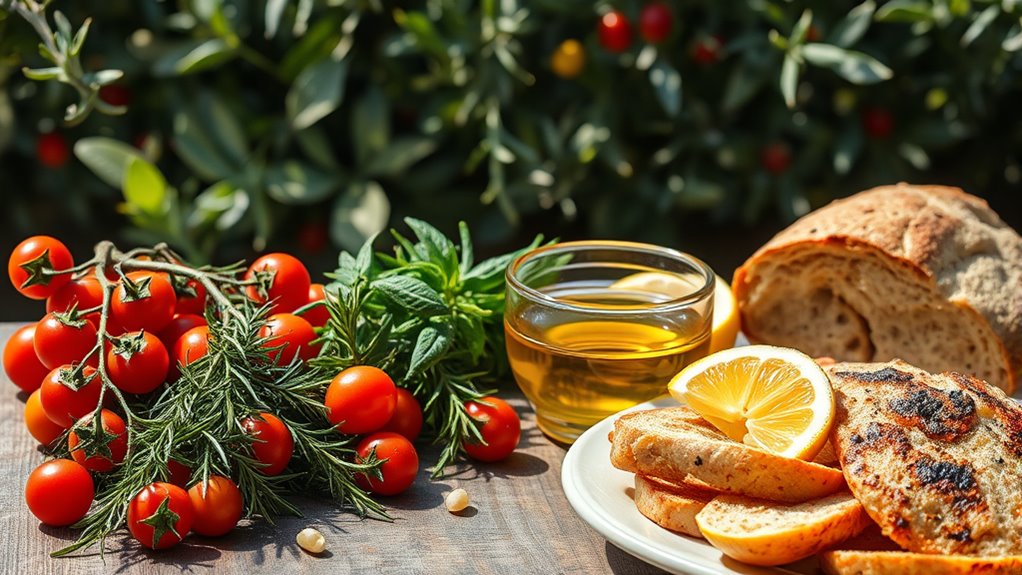The Mediterranean diet ranks #1 for 2025 because it’s proven to boost heart health, promote longevity, and support sustainable, enjoyable eating habits. It emphasizes fresh, wholesome ingredients like extra virgin olive oil, vegetables, fruits, nuts, and lean proteins, all while encouraging mindful eating and social connection. Its focus on flavorful, natural foods not only benefits your long-term health but also makes meals satisfying and enjoyable. Keep exploring to discover how this vibrant diet can transform your lifestyle.
Key Takeaways
- It emphasizes fresh, wholesome ingredients and sustainable eating habits, promoting overall health and well-being.
- Rich in healthy fats like extra virgin olive oil and omega-3s, reducing heart disease risks.
- Promotes balanced, satisfying meals that support long-term weight management and energy levels.
- Contains antioxidants and fiber that combat inflammation and prevent chronic illnesses.
- Celebrates cultural traditions, social eating, and mindful living, leading to improved longevity and quality of life.

Have you ever wondered why the Mediterranean Diet is praised for its health benefits? It’s because it emphasizes fresh, wholesome ingredients and sustainable eating habits that promote overall well-being. Central to this diet is its focus on olive oil, which is often regarded as one of the most beneficial fats you can include in your meals. Olive oil benefits aren’t just limited to its rich flavor; it’s packed with monounsaturated fats, antioxidants, and anti-inflammatory compounds that help reduce your risk of chronic diseases like heart disease and stroke. When you incorporate high-quality extra virgin olive oil into your cooking, you’re not only enhancing the taste of your dishes but also giving your body powerful nutrients that support your health long-term. This emphasis on olive oil is a hallmark of Mediterranean cuisine, which is celebrated worldwide for its vibrant flavors and health-promoting qualities. Additionally, including seeds such as chia can boost your nutrient intake, providing beneficial omega-3 fatty acids and fiber that support heart and gut health nutritional benefits.
Olive oil’s rich flavor and health benefits make it essential to the Mediterranean diet’s vitality.
Mediterranean cuisine isn’t just about olive oil, though. It’s a balanced approach that includes plenty of vegetables, fruits, nuts, whole grains, lean proteins like fish and poultry, and moderate amounts of dairy and wine. You’ll find that this combination creates meals that are satisfying yet light, helping you maintain a healthy weight and energy levels. The diet’s emphasis on fresh, seasonal ingredients means your meals are not only nutritious but also flavorful, making it easier to stick with healthy eating habits over time.
One of the key reasons the Mediterranean Diet ranks so highly for 2025 is its proven ability to support heart health. The healthy fats from olive oil and nuts, along with fiber-rich foods like whole grains and vegetables, work together to lower your bad cholesterol levels and improve your blood pressure. Plus, the diet’s focus on plant-based foods means you’re naturally eating more antioxidants, which fight inflammation and oxidative stress—two factors linked to aging and chronic illnesses. The variety and richness of Mediterranean cuisine also help prevent dietary boredom, keeping you motivated to continue healthy habits.
Moreover, adopting this diet isn’t about restriction; it’s about embracing a lifestyle rooted in fresh, flavorful foods that nourish your body and soul. The principles of the Mediterranean Diet encourage mindful eating, social connection, and enjoyment—all essential components of long-term health and happiness. Whether you’re preparing a simple vegetable salad drizzled with olive oil or a hearty fish stew, you’re engaging with a culinary tradition that’s been proven to enhance longevity and quality of life. So, by choosing the Mediterranean Diet, you’re not only making a smart nutritional decision but also joining a cultural celebration of health and flavor.
Frequently Asked Questions
How Does the Mediterranean Diet Compare to Other Popular Diets?
You’ll find the Mediterranean diet stands out because it emphasizes plant-based options and limits meat consumption, making it healthier and more sustainable than many other diets. Unlike low-carb or keto plans, it promotes balanced eating with fruits, vegetables, whole grains, and healthy fats. This approach supports heart health and weight management while allowing flexibility. Compared to diets that restrict entire food groups, the Mediterranean diet offers variety and long-term sustainability.
Can the Mediterranean Diet Be Adapted for Vegetarians?
Yes, you can adapt the Mediterranean diet for vegetarians by incorporating more plant-based options. Focus on vegetarian adaptations like beans, lentils, nuts, seeds, and plenty of vegetables and fruits. Swap fish and seafood for hearty plant proteins, and use olive oil and herbs for flavor. This way, you maintain the diet’s health benefits while enjoying diverse, satisfying meals that align with a vegetarian lifestyle.
What Are the Long-Term Health Benefits of the Mediterranean Diet?
By following the Mediterranean diet long-term, you can improve your heart health and boost cognitive longevity. It emphasizes healthy fats, fruits, vegetables, and whole grains, which help reduce inflammation and lower risks of heart disease. Plus, its nutrient-rich foods support brain function and may delay cognitive decline. Sticking with this diet over time can lead to a healthier, more vibrant life, keeping your body and mind in top shape.
Are There Any Common Misconceptions About the Mediterranean Diet?
Think of the Mediterranean diet as a vibrant tapestry, not just a rigid set of rules. Many believe it’s only about olive oil and fish, but that’s a myth debunked—it’s a flexible, culturally rich approach. Cultural misconceptions often overshadow its diversity, leading you to think it’s restrictive. In reality, you can enjoy a variety of foods, making it sustainable and enjoyable without sacrificing flavor or tradition.
How Accessible Are Mediterranean Diet Ingredients Worldwide?
You’ll find that ingredient availability varies worldwide, affecting how accessible the Mediterranean diet is for you. In many regions, fresh produce, olive oil, and seafood are readily available, making it easier to follow the diet. However, some ingredients might be harder to find or more expensive outside Mediterranean countries. Still, with a little effort, you can adapt the diet using local alternatives, ensuring global accessibility and health benefits.
Conclusion
So, there you have it—by embracing the Mediterranean diet, you’re practically signing up for a lifetime of effortless health, all while savoring delicious, fancy-sounding dishes. Who knew that swapping fast food for olive oil and fish could turn you into a wellness guru? As 2025 rolls in, remember: it’s not just a diet, it’s a lifestyle choice for those who prefer their health served with a side of sophistication—and a dash of Mediterranean flair.









